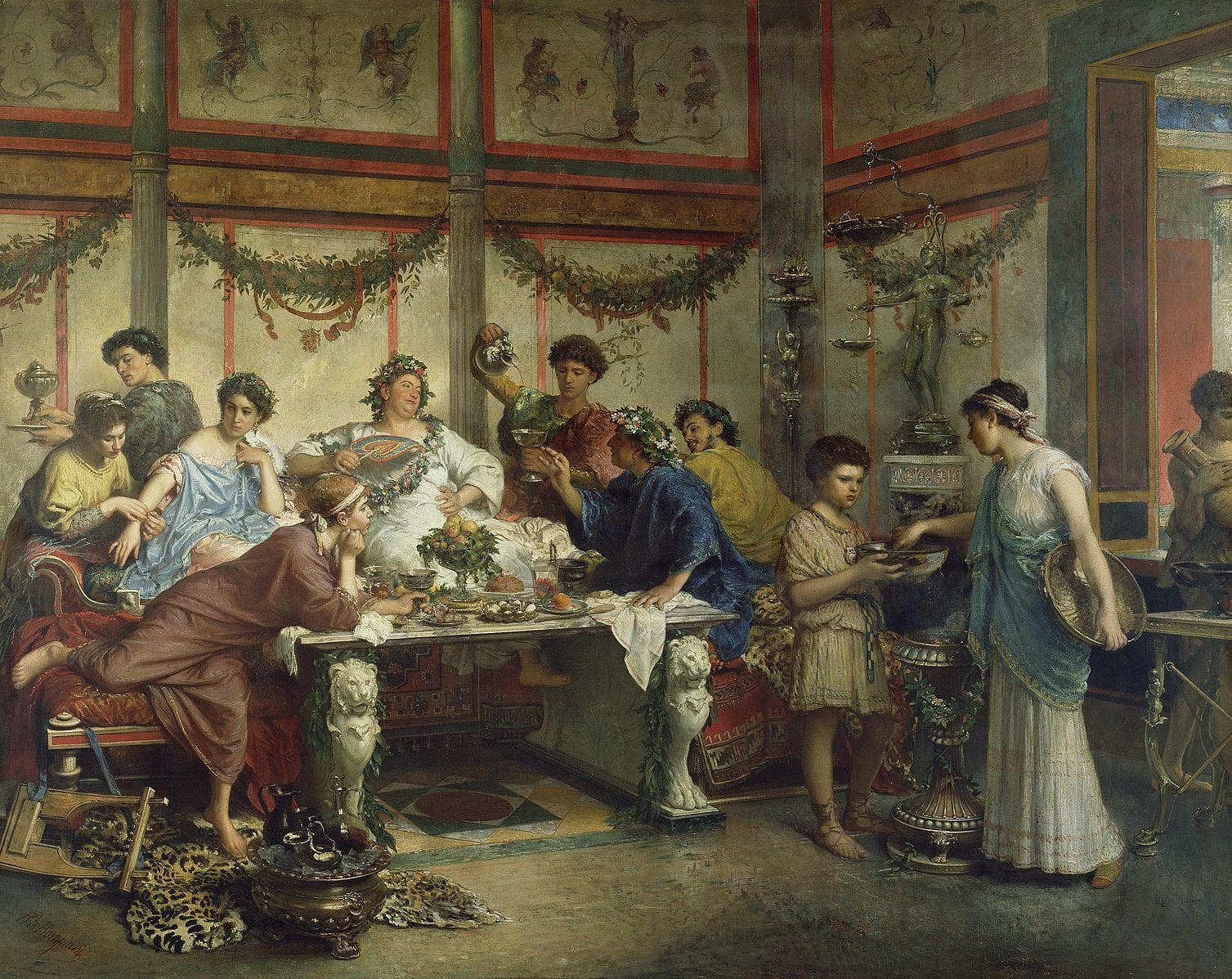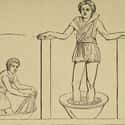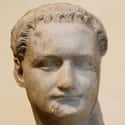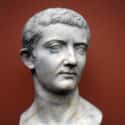-
(#13) Augustus's Chief Deputy Designed The First Thermae
Larger public bathing facilities in Rome were known as "thermae." These were often commissioned by emperors and served as a location for socialization.
Thermae featured dressing rooms with holes in the walls for patrons to store their belongings, a tepidarium which contained a pool of warm water, a caldarium which contained a pool of hot water, and a frigidarium which contained a pool of cold water. Some thermaes even had outdoor swimming pools, dry saunas, and a gymnasium.
The very first thermae, which succeeded the smaller bath houses that came before it, was commissioned by Augustus and designed by his chief deputy, Agrippa, in 25 BC. After that, Roman emperors began commissioning larger and more elaborate thermae for public bathing purposes.
-
(#7) Emperors Valued Urine Because Romans Used It To Clean Clothes
Romans didn't have soap in the modern sense, but they did find other ways to clean clothes. One of the most valuable resources for laundry service was urine. Romans used human and animal urine, which were both high in ammonia, to strip clothes of dirt and oil. Traders would gather this commodity from public toilets.
Taxes levied on urine generated revenue to pay Roman troops, a plan first instituted by Emperor Vespasian (9-79 AD). Vespasian's son, Titus, was repelled by the tax, which, according to Suetonius, led to the following exchange:
When Titus found fault with [Vespasian] for contriving a tax upon public conveniences, he held a piece of money from the first payment to his son's nose, asking whether its odor was offensive to him. When Titus said "No," he replied, "Yet it comes from urine."
-
(#12) Baldness Prompted Emperors To Wear Wigs
Short haircuts were common among emperors, but few relished a thin or fading hairline. According to Suetonius, Emperor Domitian (51-96 AD) wrote a book called On the Care of the Hair, which reads:
Do you not see that I am too tall and comely to look on?
And yet the same fate awaits my hair, and I bear with resignation the aging of my locks in youth. Be assured that nothing is more pleasing than beauty, but nothing shorter-lived.
Displeased with his own hair loss, Domitian had himself depicted in coins and statuary with a full head of hair, and wore a wig later in life.
One of his predecessors, Otho, also wore a hairpiece to hide "the thinness of his locks." Suetonius claimed the wig was "so carefully fashioned and fitted to his head, that no one suspected it."
Emperor Caracalla (188-217 AD) wore a wig as well, but not to hide a balding head. During a tour of the empire, he became "especially fond of the Germans," to the point that he preferred German clothes to his Roman cloak and donned "a yellow wig with the locks arranged in German style."
The Germans were "delighted with the emperor's antics," Suetonius wrote, and "became very fond of him" in turn - though this may have had more to do with his "lavish gifts of money" than his fashion sense.
-
(#2) Contemporary Medicine Encouraged Emperors To Leave Their Acne Alone
Emperor Tiberius (42 BC-37 AD) was called "handsome" by Suetonius, though the author noted that he "would break out on a sudden with many pimples."
Acne wasn't without remedy during the 1st century. Medical writer Aulus Cornelius Celsus produced an entire treatise on health, cleanliness, and the treatment of various diseases and afflictions, including skin problems.
In his De Medicina, Celsus wrote, "To treat pimples and spots and freckles is almost a waste of time." However, in the event that one did attempt to remove them, Celsus prescribed the following treatment:
[Pimples are] best removed by the application of resin to which not less than the same amount of split alum and a little honey has been added. A spot is removed by equal quantities of galbanum and soda pounded in vinegar to the consistency of honey. With this the part is to be smeared, and after the lapse of several hours... it is washed off, and the place anointed lightly with oil.
-
(#1) Early Roman Emperors Often Kept Their Hair Short And Shaved Their Beards
Through the first half of the 1st century BC, Roman men commonly wore their hair and facial hair long. When Julius Caesar (100-44 BC) came to power, he became a model for shorter hair in general. According to Roman historian Suetonius,
[Caesar] was somewhat overnice in the care of his person, being not only carefully trimmed and shaved, but even having superfluous hair plucked out, as some have charged; while his baldness was a disfigurement which troubled him greatly, since he found that it was often the subject of the gibes of his detractors. Because of it he used to comb forward his scanty locks from the crown of his head, and of all the honors voted him by the senate and people there was none which he received or made use of more gladly than the privilege of wearing a laurel wreath at all times.
This became the norm for emperors, and Greek barbers were brought to Rome to maintain cleanly shaven appearances. Emperor Otho (32-69 AD) was said to have tried a different approach. Apparently, he shaved "every day, and since boyhood had always used a poultice of moist bread to prevent growth of his beard."
It wasn't until Hadrian (76-138 AD) that another Roman emperor wore a beard, and he may have done so to hide skin deformities on his face.
-
(#6) To Get Rid Of Toothaches, Emperors Had To Expel 'Small Worms' From Their Teeth
Treatment for dental pain was generally carried out by barbers or surgeons in imperial Rome. When a Roman developed a toothache, 1st-century physician Celsus advised the elimination of wine and hard foods. He further recommended:
Steam from hot water is to be applied by a sponge, and an ointment put on made from cyprus or iris oil, with a woollen bandage over it, and the head must be wrapped up... [with] whatever is applied to the teeth directly, none the less the ointment mentioned above must also be put on the jaws and covered over with wool.
When Emperor Claudius (10 BC-54 AD) developed a toothache, his doctor allegedly cured him by burning hyoscyamus seeds and rinsing his mouth with hot water. "In this way," the doctor wrote, "small worms are expelled." At the time, it was believed that cavities and tooth pains were caused by worms gnawing from inside the teeth.
New Random Displays Display All By Ranking
About This Tool
Hygiene in ancient Rome includes the famous public Roman baths, toilets, exfoliating cleaners, public facilities, and usually with high standards of cleanliness. The ancient Romans paid special attention to the cleaning of daily life, and the ancient Roman emperors had perfect cleaning procedures and luxurious bathroom accessories. The Romans, including women and slaves, would wash every day, if not more frequently, there would be a thorough bath at every festival.
Most ancient Roman emperors cared about beauty and cleanness includes hair removal, not just men’s beards, such as Julius Caesar. The random tool described 14 details about what hygiene was like for an ancient Roman emperor.
Our data comes from Ranker, If you want to participate in the ranking of items displayed on this page, please click here.
















